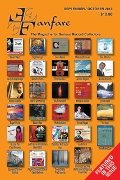Texte paru dans: / Appeared in:

Fanfare Magazine: 37:1 (09-10/2013)
Pour
s'abonner / Subscription information
Les abonnés à Fanfare Magazine ont accès aux archives du
magazine sur internet.
Subscribers to Fanfare Magazine have access to the archives of the magazine
on the net.
Naïve
V 5326

0822186053263 (ID308)
Consultez toutes les évaluations recensées pour ce cd
~~~~ Reach all the evaluations located for this CD
This is a most unusual disc, consisting as it does of various bits and pieces that were excerpted from better-known larger works, mainly operas, by George Frederick Handel. During the 18th century it was quite common for composers such as Handel to vary the score of a stage work frequently, sometimes from night to night depending upon what worked, how the audience reacted, how the singers felt, or simply because of his own satisfaction or dissatisfaction at any given time. The idea of the score being an iconic document in its own right simply did not exist, and Handel, along with everyone else, was quite practical about the matter of performances. After all, one tends to forget that they were in it primarily to make a living, not create works that would inevitably become part of a giant canon (though some, of course, did). Although there are “complete” performances of works such as Rinaldo or Ottone, all of the various gyrations that the composer did to respond to his performance world are hardly included. As a result there are a plethora of orphans out there which would never be heard unless discs like this come along.
One might be tempted to think of this as outlining the talents of Ann Hallenburg, who is billed as a mezzo-soprano but has a rich voice that has power and depth in the lower registers enough to be considered an alto. Here the sound is very much like that of the castratos for which the bulk of these parts was written. And these are versatile pieces which ought not to have been excluded. For example, “Lusinga questo cor” was written as an insertion to Amadigi, Rinaldo’s successor from1715, and since it exists only in a collection of miscellaneous arias, there is some difficulty in placing it. But right off the bat the voice launches into an extremely winding vocal line that virtually explodes out of the instrumental introduction. And speaking of Rinaldo, Handel had at hand soprano Anastasia Robinson for its revival in 1714, and for her flexible voice wrote several effective arias, including the plaintive “La crudele lontananza,” in which the lamenting lines with long mezzo di voce unfold in emotional waves. The insertion aria for the 1737 Berenice, “le vicende della sorte,” is replete with syncopations and a tripping little main theme that seems to roll off the throat most adequately.
Alan Curtis’s early-instrument group performs things with nicely up-beat tempos. There is no rushing about, no hurried pace, but rather it follows the needs of the text and singer. The Handelian sound where the oboes often double the strings is clear and precise, and when one gets to the instrumental insertions, the grandeur of the works shines forth. In particular the March in F Major sounds like it could have been excerpted from the Fireworks Music, save that it was composed over a decade earlier (and to be sure, Handel did paraphrase some of it). The D-Major March, with its bellicose trumpet part, ought to replace the worn Voluntary of Jeremiah Clarke; it is suitably stately, but alas lasts less than a minute.
In short, this is the sort of disc that displays things not often heard, the discarded or alternative operatic worlds that Handel created, and although the pieces are divorced from the contexts within the operas to which they belong, their performance here offers a glimpse into the fecund mind of the composer. The disc is excellent, well recorded, and should be in the collection of every Handel lover.
Cliquez l'un ou l'autre
bouton pour découvrir bien d'autres critiques de CD
Click either button for many other reviews


